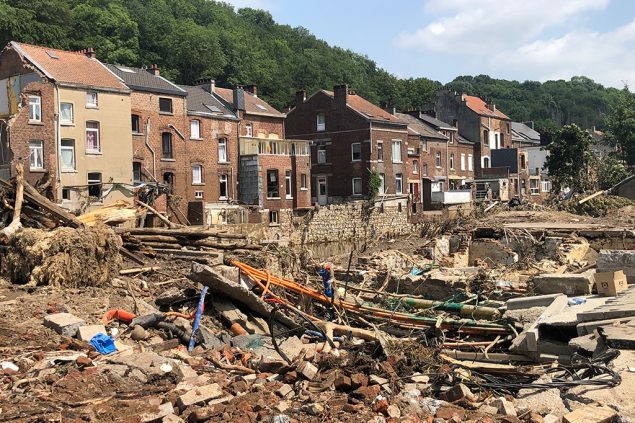After last week's severe floods, 1,650 families still have no drinkable water, and 9,000 people in Pepinster and Verviers have to look for alternative accommodation, according to Alain Barbier, the chief of police for the Vesder police zone.
The storm left a trail of destruction in many places in Wallonia, and there is almost no water, electricity or gas available in the Liège municipalities of Pepinster and Verviers, for example, there is almost no water available, said Barbier.
"Some 9,000 people from Pepinster and Verviers have to look for another place to live," he said in VRT's 'Terzake' programme. "Many cars have also been destroyed."
Barbier parents - aged 89 and 85 - were also hit by the disaster, and are now beginning to realise that they can no longer stay in their homes, according to him. "For the next five months they will not be able to use gas."
Related News
- Politicians ignored warnings about flood risk for decades, climate expert says
- Data of pet owners made available in search for animals in flooded regions
- Flood-hit areas could now face spread of infectious diseases
Additionally, 1,650 families are still without drinkable water, announced the Walloon water company SWDE on Wednesday.
The figure has gone down from the 3,400 families who did not have drinkable water on Monday, but in Pepinster, where 150 families are completely without water, the problems persist.
In Rivière, a municipality of Profondeville, drinking water is available again, as well as in Lustin. In Floriffoux, a municipality of Floreffe in the province of Namur, drinkable water is coming from the tap again as well.
The municipalities without drinking water are all situated in Namur.
Additionally, the municipalities of Bois de Villers (Profondeville) and Dison do have water, but not continuously, due to a leak which is currently being repaired.
In two municipalities there is no continuous water supply: in Bois de Villers (Profondeville) and Dison. A leak, which is being repaired, is disrupting the water supply to fifty families.
SWDE will continue to distribute water bottles in communities where water has not been restored: in Dave, the distribution will be done door-to-door. In Pepinster, the distribution is done in the streets.
Hot meals
The Red Cross also started food distributions today, which will help some 10,000 families in the coming weeks and even months.
The distribution started with a test in Trooz, between Liège and Pepinster. "We delivered 700 hot meals: 350 in the afternoon and 350 in the evening," said spokesperson Jan Poté.
"Today we are scaling up to a total of 1,000 hot meals. It's a start," he added, explaining that the Red Cross currently works with a catering company, but expects that it will have to scale up in the near future.
"Now we also drive around with vans, but as of Thursday, these will become trucks," Poté said. "The meals and their distribution are paid for by the resources we receive from the 2525 fund, to which more than €3.9 million has already been donated."
He stressed that the food distribution is very necessary, because even the people who can return to their homes often do not have electricity or gas.
"Electricity, from what we hear, could be solved fairly quickly, but gas is apparently a different story," he added. "It could take weeks, and in the worst cases months, before all houses are connected again. So these people cannot cook. These are needs that are very evident."
For people who want to help, the easiest way is to make a donation to the Red Cross account number on BE70 0000 0000 2525.
People who want to help as a volunteer are asked to register on the Red Cross crisis volunteer platform, and not just go to the affected areas on their own initiative.

